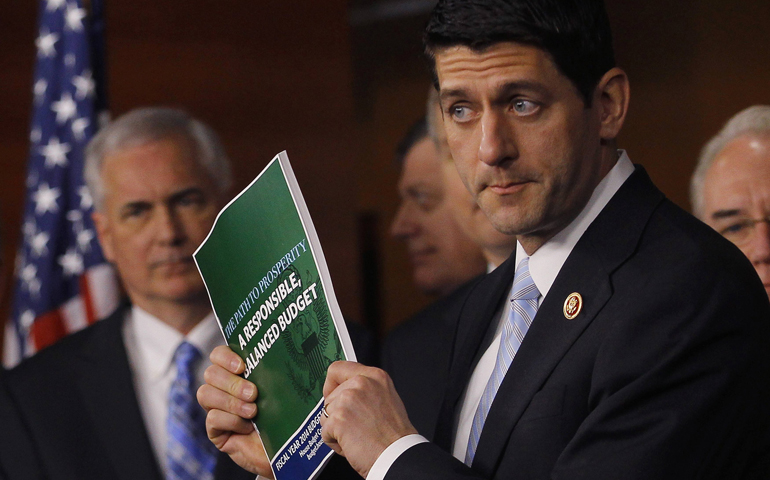
House Budget Committee Chairman Rep. Paul Ryan (R-Wis.), unveils the Republicans' 2014 fiscal year budget resolution in Washington March 12. (CNS/Reuters/Gary Cameron)
Alumni of a small Catholic college in northeast Kansas* have objected to the selection of U.S. Rep. Paul Ryan, the 2012 Republican vice presidential candidate from Wisconsin, as the commencement speaker at Saturday's graduation.
In a letter to alumni, the president of Benedictine College, in Atchison, Kan., said he chose Ryan, chair of the House Budget Committee, as speaker because of "our desire to inspire in our students the ambition to aim high. We regard having a national figure on our campus as a great opportunity."
But critics say that the congressman's budget policies don't reflect Catholic social teaching.
Catholics may disagree on Ryan's budget proposals — a matter of prudential judgment, said Benedictine president Stephen Minnis. In a phone interview Friday morning with NCR, he defended Ryan as a laudable commencement speaker for a Catholic college.
Ryan agreed to come to the 2,000-student Kansas college on George Weigel's recommendation, Minnis explained. Wiegel, a conservative Catholic author and speaker at Benedictine's commencement last year, contacted the congressman, suggesting he would be a good speaker for the college.
When Ryan agreed, Minnis said he received the unexpected news from Weigel, and the arrangement became official after the president vetted him.
"I think [Ryan] respects George's opinion," Minnis said. "I think that George explained to him that Benedictine College is a great Catholic college in the United States … a school that's in the heart of the country and the heart of the church."
Minnis said he used his usual criteria for a commencement speaker to vet Ryan: the congressman's stance on what Minnis called "the non-negotiable," such as abortion and same-sex marriage, are in line with the official teachings of the Catholic Church.
Minnis also said he consulted Bishop Robert Morlino of Madison, Wis., Ryan's bishop, and Archbishop Joseph Naumann of Kansas City, Kan. They both indicated that Ryan is "making a sincere effort to make his budget consistent with Catholic social teaching and they did not see this [budget] as a non-negotiable," Minnis told NCR.
Minnis said he "appreciates [Ryan's] sincerity in creating a budget which he believes is consistent with Catholic social teaching."
Catholics using prudential judgment may come to other conclusions about the Ryan budget, but that doesn't disqualify the congressman from speaking at Benedictine's commencement ceremony, Minnis said.
Benedictine Sr. Barbara McCracken disagrees.
A Benedictine alumna and member of the Mount St. Scholastica Monastery community (a co-sponsor of the college with St. Benedict's Abbey monks), she says that the choice of Ryan as commencement speaker is inappropriate because his budget takes money away from programs that poor people need for survival. For her, that is a non-negotiable.
Through her work as associate director at the Keeler Women's Center in Kansas City, Kan., McCracken said, "I see too many people who don't have enough money … enough social benefits coming from the government to help them make it."
"These are people who [are] handicapped, unemployed, supporting small children or very aged people in their families," McCracken explained.
According to the Center on Budget and Policy Priorities, Ryan's budget aims to lower the national deficit by calling for major cuts to social services like Medicaid, transportation, schools, health care and law enforcement.
The center said it would cut federal funding 31 percent for the federal-state Medicaid program by 2023; about $139 billion in cumulative cuts to state and local transportation aid over the next 10 years; and cut non-defense, non-entitlement funding over the next 10 years, leading states and localities to lose almost $25.2 billion in 2014.
An online petition begun by Benedictine alumni has sought to remove Ryan as commencement speaker. The Change.org petition says that his budget proposals do not follow the three moral criteria for protecting the poor that the U.S. bishops put forth in an April 2012 statement:
- Every budget decision should be assessed by whether it protects or threatens human life and dignity.
- A central moral measure of any budget proposal is how it affects "the least of these" (Matthew 25). The needs of those who are hungry and homeless, without work or in poverty should come first.
- Government and other institutions have a shared responsibility to promote the common good of all, especially ordinary workers and families who struggle to live in dignity in difficult economic times.
The petition, begun April 16, has garnered 306 signatures of support, as of Friday.
Minnis told NCR that while he applauds the protesters for using their First Amendment right to free speech, he is disappointed that they "are not willing to let someone else speak on campus."
Though Ryan has said his budget priorities come from the roots of his Catholic faith, many Catholics have criticized them as inconsistent with Catholic social teaching, since the poor are most affected by major cuts to social programs.
Another Benedictine alumnus Richard Homan, a retired Washington Post journalist, sent an email April 19 to Minnis, urging him to reconsider the decision.
Homan told NCR though he has supported the college based on past positive experiences, he "had noticed in recent years that the administration at Benedictine College has become more conservative … on society and dealing with the poor."
Homan told the president he objected to the selection because the "social and political positions Ryan espouses contradict the positions I learned as a student of the Atchison Benedictines both at Maur Hill and then-St. Benedict's College."
In response to Homan, Minnis attached Ryan's speech to the Conservative Political Action Conference that he says carries "key Benedictine principles," such as community, listening and stewardship. He also acknowledges that "not everyone will agree with [Ryan's] interpretation [of Catholic social teaching]," but that it should not be a reason to "bar someone like him from speaking on our campus."
Minnis told NCR he believes that the visit could be used as a discussion tool in a Catholic social thought class held on campus in the fall. He said the budget would be a good tool to discuss whether or not it is consistent with the teachings of the church.
"I just don't think his budget and his policies … are beneficial to the poor," she said. "I don't think they reflect Catholic social teaching," said McCracken, who worked for the Archdiocese of Kansas City, Kan., as a consultant for the Peace and Justice Office from 1990-2003.
Though Homan understands the "non-negotiable" teachings of the Catholic church, he says they are not the only teachings.
"[Being] pro-life? Fine, that's part of the Catholic tradition, but I would say doing your best to help the wealthy and doing your least to help the poor is not a part of Catholic tradition," Homan said, referring to Ryan's budget.
Protesters to Ryan's speaking are expected to arrive in Atchison ahead of the scheduled 10 a.m. start of commencement exercises, and plan to stand across the street from the college's entrance.
The planned protest is reminiscent to another rally held in April 2012 at Georgetown University in Washington. Opponents of Ryan's budget greeted him inside and outside Gaston Hall as the Wisconsin congressman came to campus to deliver the Whittington Lecture for Georgetown's Public Policy Institute.
More than 90 faculty and administrators signed a letter strongly disagreeing with Ryan's budget and the interpretation of Catholic teaching he used to justify it.
*An earlier version of this story misidentified the location of the college.
[Eloísa Pérez-Lozano is an NCR Bertelsen intern. Her email address is eloisapl@ncronline.org.]


